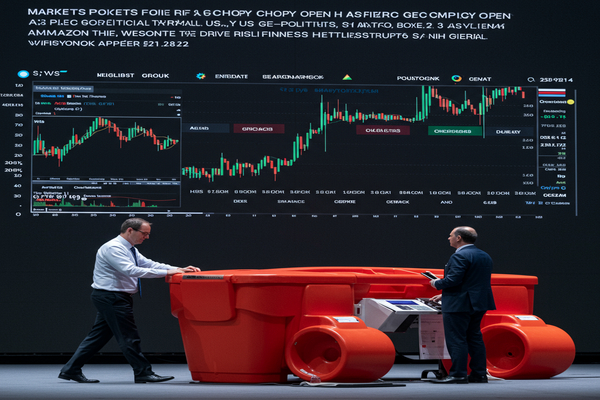
Markets face a cluster of immediate drivers that will set the tone for the session. US war games over a hypothetical Chinese attack on Taiwan, US strikes at sea that raise questions about Venezuela, tight gubernatorial races in New Jersey and Virginia, and fresh Amazon Basin stories from Brazil are all reshaping sentiment today. In the short term traders will react to headlines and flows into safe havens or risk assets. Over the long term these developments feed into defence spending, commodity channels, and regulatory pressure that matter for regional markets in the US, Europe and Asia as well as for emerging market exporters.
Geopolitical drills and the Asia Pacific test
How military planning around Taiwan and the Philippines could change risk premia for Asia and global trade
Reports that the United States is war-gaming scenarios for a Chinese attack on Taiwan bring the northern Philippines into sharper focus. Batanes province has moved from a backwater to a frontline location because control of those island approaches influences naval access in the South China Sea. That matters now because the planning highlights choke points that would affect shipping routes and regional military logistics within weeks of any conflict.
Markets track such developments closely because they feed through immediately to commodity routes and to investor appetite for Asian equities and regional currencies. In the near term traders may price in higher volatility for Taiwan and the Philippines, and for sectors exposed to maritime transport. Over the longer term this kind of strategic emphasis tends to support spending on defence contractors and on infrastructure that reroutes or hardens supply chains across Asia.
Investors in the US and Europe will watch related intelligence updates and diplomatic moves for signs of escalation or de-escalation. Meanwhile, Asian exchanges and bond markets will react to shifts in perceived risk, and emerging markets that rely on trade through narrow waterways could see wider credit spreads if the situation looks prolonged.
US operations at sea and the Venezuela question
Maritime strikes, legal concerns and how the incidents feed into geopolitical and commodity anxiety
US strikes against suspected drug vessels in the eastern Pacific and Caribbean have produced significant headlines after reports that dozens were killed and that participating officials were asked to sign non-disclosure agreements. Venezuela has voiced fears that the activity could presage a larger military buildup, and questions about the legality of the strikes are now in the public domain.
That matters now because markets rarely separate legal controversy from operational risk. In the short run oil and shipping insurers could react to any perception of maritime instability. Energy traders will watch for any disruption in tanker routing or a pickup in security premia. In the medium term, regional countries may adjust naval deployments and maritime policies, a move that would affect defence budgets and contractors.
For capital markets, the confluence of maritime operations and political headlines can push flows into safe-assets and increase volatility in risk-sensitive sectors. Currency pressure on nearby economies and credit spreads for sovereigns with weaker fiscal buffers may widen if uncertainty persists.
US elections and New York politics: policy risk for markets
State races and a rising mayoral candidate in New York that could affect taxation and business sentiment
Voters in New Jersey and Virginia head to the polls for gubernatorial contests that could offer a short-term political barometer for national parties. Democrats are seeking momentum ahead of the midterm cycle, and markets will be sensitive to turnout and messaging on taxes and spending because those results can shift expectations for federal policy risk.
Closer to Wall Street, mayoral frontrunner Zohran Mamdani has outlined plans that include higher taxes on top earners, a freeze on certain stabilized apartment rents and expanded subsidized housing. Wall Street leaders are publicly concerned, while some business groups hope for moderation once governance begins. That matters now because municipal and real estate investors price in city-level policy changes quickly. In the short term equity sectors tied to banking and real estate can see heightened volatility on local policy surprises. Over time, persistent higher taxes or rent regulation would change underwriting assumptions for commercial and residential property markets in New York.
Brazil’s Amazon stories and commodity infrastructure implications
Mercury poisoning, canal plans and what they mean for soy, meat and global supply chains
Two powerful stories from Brazil are forcing a rethink about environmental and health externalities and about agricultural logistics. Public health researchers reported mounting evidence that mercury from illegal gold mining is causing neurological problems and disabilities in Indigenous children in the state set to host COP30. That matters now because such findings increase international scrutiny on environmental practices and could lead to reputational and regulatory pressure on commodities linked to the region.
At the same time the federal government has proposed blasting a channel through 22 miles of rapids to accelerate river navigation and link the farm belt more directly to export routes. That project will attract attention from logistics providers, commodity traders and environmental groups. In the near term markets will watch permitting and protest risks, because any delays or disruptions to farm exports can affect soy and meat prices globally. Over the longer term a successful transport corridor would lower export costs and change production incentives, while a stopped or contested project would amplify regulatory and ESG risks for investors with exposure to Brazilian agriculture.
Secondary headlines that can nudge sentiment
Royal family turmoil, tech tests and European fiscal clues that matter to investor psychology
Several other items in the briefing can move the mood in risk markets. The banishment of Prince Andrew by King Charles is a notable social and political event in Britain that could influence consumer sentiment and media cycles. NASA’s first test flight of the supersonic X-59 jet has technology and regulatory implications for aviation and for suppliers in aero engineering. China’s heatwaves threatening the supply of prized hairy crabs highlight how climate events can influence niche food markets and consumer prices. Italy’s rising tax evasion figures provide the latest fiscal signal from Rome and could shape discussions about tax enforcement and fiscal policy in the euro area.
Each of these items matters now because headlines drive short-term trading, and because recurring themes such as climate impact, fiscal credibility and legal exposures translate into sectoral stories for global investors. Traders will balance headline risk against macro data and corporate news during the session. For portfolio managers, the immediate task will be to weigh headline-driven volatility against existing positioning and risk limits.
Overall, the morning will likely be guided by geopolitical and political headlines that touch shipping, commodities and fiscal sentiment. Watch for directional moves in Asian equities and regional currencies in response to Asia Pacific developments, for a reaction in energy and insurance sectors tied to maritime operations, and for volatility in US financial and real estate names linked to local election outcomes. As the session unfolds, the balance between headline risk and underlying macro flows will determine whether markets retrench or find a footing.












